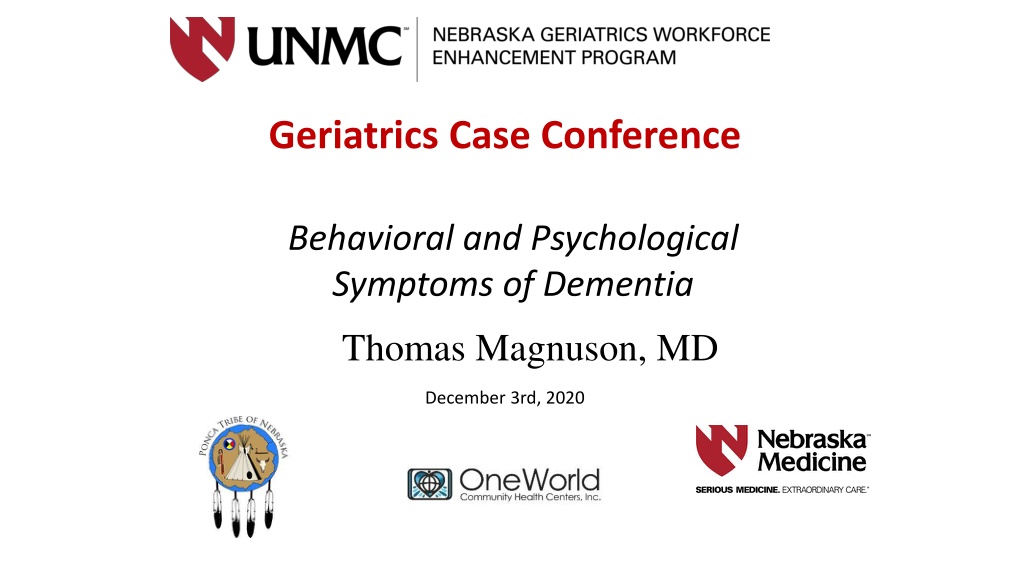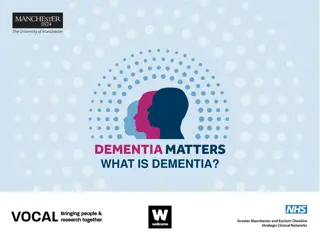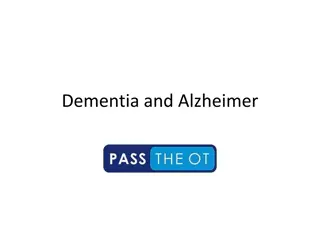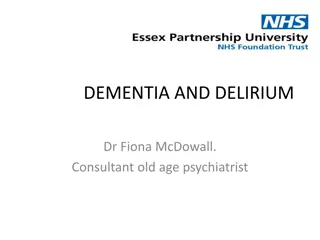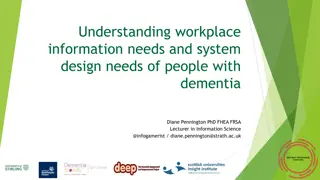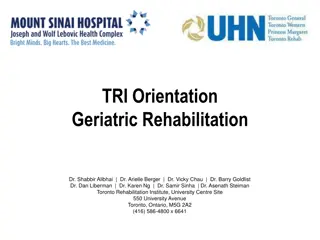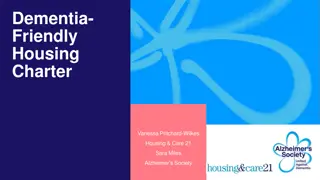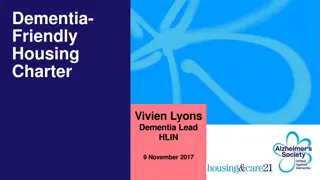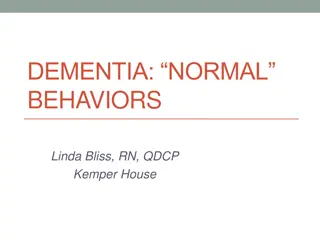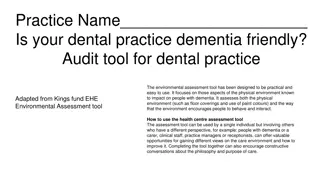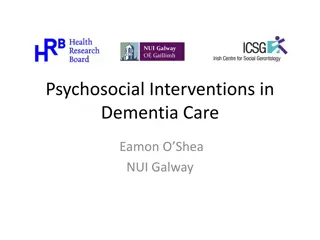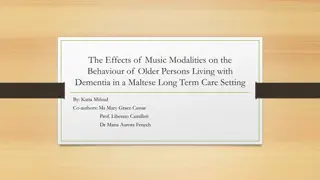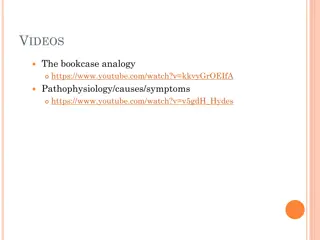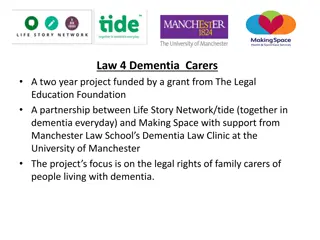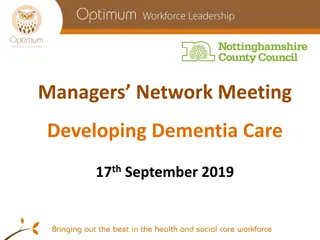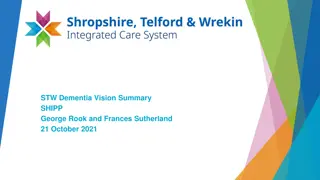Understanding Behavioral Symptoms of Dementia in Geriatric Patients
This informational content discusses the various behavioral and psychological symptoms of dementia (BPSD) in geriatric patients, including common symptoms like depression, aggression, anxiety, and apathy. It highlights the prevalence of behavioral issues in dementia patients, their impact on caregiving and nursing home placements, and the correlation between severity of dementia and behavioral problems. The material provides insights into the challenges faced by individuals dealing with dementia-related behaviors and the importance of understanding and managing these symptoms effectively.
Download Presentation

Please find below an Image/Link to download the presentation.
The content on the website is provided AS IS for your information and personal use only. It may not be sold, licensed, or shared on other websites without obtaining consent from the author. Download presentation by click this link. If you encounter any issues during the download, it is possible that the publisher has removed the file from their server.
E N D
Presentation Transcript
Geriatrics Case Conference Behavioral and Psychological Symptoms of Dementia Thomas Magnuson, MD December 3rd, 2020
This program is supported by the This program is supported by the Health Resources and Services Health Resources and Services Administration (HRSA) Administration (HRSA) of the U.S. Department of Health and Human Services (HHS) as part of an award totaling 751,695.00 with 0% financed with non-governmental sources. The contents are those of the author(s) and do not necessarily represent the official views of, nor an endorsement, by HRSA, HHS, or the U.S. Government. For more information, please visit HRSA.gov.
Behavioral and Psychological Symptoms of Dementia Thomas Magnuson, M.D. Associate Professor Division of geriatric of Psychiatry UNMC
Dementia Symptoms Primary dementia symptoms Memory loss In many cases the presenting symptom Plus other symptoms Communication problems Failure of the senses Motor difficulties Executive errors Changed personality
Behavioral and Psychological Symptoms of Dementia (BPSD) Secondary symptoms Depression Psychosis Aggression/Agitation Disruptive vocalizations Anxiety Apathy Night-time behaviors Hypersexuality
Behavioral Problems Pervasive 80-90% of all dementia patients will have at least one behavioral problem Agitation 25-87% Restlessness 40-60% Aggression 11-46% Positive correlation severity of dementia and behavioral problems 13.8-37.5% mild 62.5-66.5% severe
Behavioral Problems Agitation Wandering 18-50% Hypersexuality 2-7% Disruptive vocalizations 11-47% Hoarding, stealing 15-22% Disrupted sleep cycle 25-35% Resistance to daily cares 13%
Behavioral Problems Often lead to placement Nearly 60% of demented patients at home have at least one behavioral symptom The prevalence of behavioral symptoms increases as the patient s cognitive impairment worsens Direct link between level of cognition and nursing home placement Dementia-related behaviors as predictor Usually cited as a leading reason for admission 46% in Buhr GT, et al. (2006)
Behavioral Problems A variety of etiologies Medical Acute onset UTI, hyponatremia, pneumonia, fracture Chronic changes CHF, COPD, pain from arthritis Pharmacologic/Substance Anticholinergic medications Corticosteroids Alcohol Psychiatric Depression, anxiety and psychosis Due to dementia
Psychiatric Mood Depression, hypomania, mania 25-50% of patients with dementia will develop depression from the dementia 50% of Nursing Home residents have depression Much, but not all is from dementia Anxiety Generalized to more specific presentations 29-44% of demented patients will have anxiety Psychosis Hallucinations and delusions 20-50% prevalence
Basic Approach Information gathering History Paramount No one became borderline at 75 years old Didn t your mother ask what you did to make your brother sock you? Human nature to think it was not caused by anything I did Data MAR, nursing notes, behavioral sheets Context of the problem The reporter s questions who, what, when Just calling on this shift Call back and ask the evening shift They must be very specific All the time means we don t know Dysfunctional or distressing Non bothersome hallucinations are not treated Neither are life-affirming delusions Not dysfunctional for the nursing staff Having trouble with toileting is an educational issue
Basic Approach Be wary of suggestions on faxes By people who are well-meaning, but uniformed Seroquel 50 mg a day. Yes or No? Inpatient psychiatry Vacation for the staff Threats to families of eviction Look a lot different in the ED Once they get there they do not have to take them back Defer dementia patients Placement issue Be wary of small town hospitals Return on mucho meds Stay until their insurance runs out Low-hanging fruit from a reimbursement standpoint
Basic Approach Nonpharmacologic Have resources available to pass on to the staff Multiple sources these days https://www.unmc.edu/intmed/divisions/geriatrics/education/resources/dementia.html Need a nonpharmacologic treatment plan Pharmacologic Know what your target symptoms are Not much definitive information that anything works Safety issues abound Medication has a place Constant reassessment for tolerance, safety, efficacy Start low, Go slow
Basic Approach At home Caregiver burden Resources to aid lessen burden Who is the actual patient? Capacity of the caregiver Formal and non-formal network of services When to move the patient Relieve the family of guilt This is a MEDICAL decision Prevent more rapid deterioration Where to move the patient Don t be fooled by furniture Wallet biopsy Ambulatory, younger, aggressive demented males
Have specific questions? Curbside You are paying my salary Discuss options, care plan tmagnuson@unmc.edu 402-552-6007
